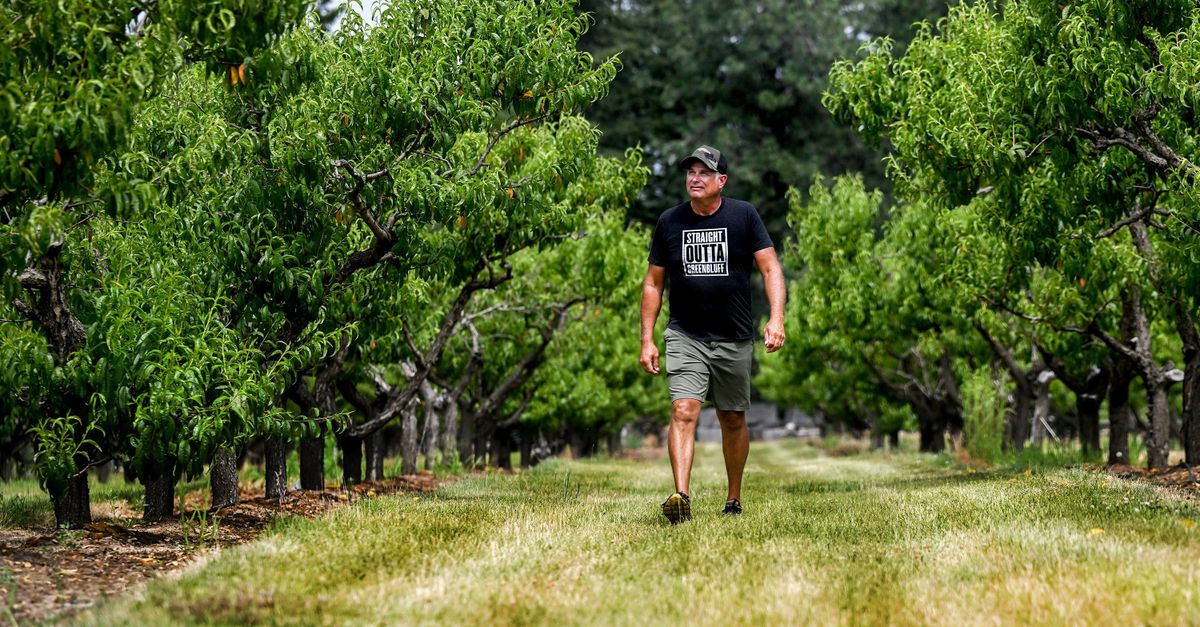Weird winter weather was the pits for Green Bluff peaches and cherries

The summer months at Green Bluff are normally known as peak peach season. This year, however, the trees are bare.
Last winter’s unusual temperature drops have been long forgotten by most locals now coping with a string of hot days. But not by Walter’s Fruit Ranch Owner Jason Morrell, particularly because of the damage done on Jan. 12 to his fruit trees.
“The way it started was basically last fall, we had record high temperatures,” Morrell said, “so the peach trees didn’t get the signal to go dormant.”
A less peculiar year for the peaches and cherries would have brought these trees into dormancy during the fall, pulling their water down and into the base of the root, Morrell said.
The lingering warmth didn’t signal the trees to drain their water as the cold weather normally would have, so the crops remained green and awake longer than usual.
Without the gradual transition to Spokane’s cold winters, the buds that would have eventually become stone fruits such as peaches, plums, nectarines, apricots and cherries did not get hardened, damaging many of the trees.
“Jan. 12 was the event we had where it was below 16 degrees for about a week,” Morrell said, “and that’s when the damage was done.”
The sudden temperature drops while the trees were not prepared for winter weather froze the branches containing water that typically wouldn’t have been there.
The week of bitter cold created ice crystals in the tender shoots of branches where the buds were, Morrell said, shattering them from the inside out.
Blooming season came around, “and it looked like everything was normal,” Morrell said, “but when time came for buds to turn into flowers they just disintegrated into powder.”
Green Bluff’s Cherry Hill Orchard and Market Owner Ronda Bosma said her orchard also experienced this phenomenon.
“As a result of this damage, these trees have no flowers, and with no flowers – no fruit,” she said.
“It’s pretty much a record event up here for the peaches,” Morrell said, “all the peaches in Green Bluff are gone, they’re not dead, the trees aren’t dead, but this season we will not have peaches.”
The shocking effects of this most recent winter’s weather have had damage reaching north through British Columbia and east to Flathead Lake Cherry Growers in Bigfork, Montana, Bosma said, a reliable cherry source since 1935.
Though much of the state was affected, lower elevations in the big commercial fruit growing areas of central Washington did not experience the total loss that Spokane farms did, Morrell said. Walter’s will have peaches in store for customers from the Columbia Valley, Yakima and Quincy.
This fruit will be the same quality as what Green Bluff would usually sell, “not what you would find in grocery stores,” Morrell said.
The Washington State Tree Fruit Association confirms that this year’s crops were affected by last winter’s weather.
Cliffside Orchard in Kettle Falls has never experienced this total loss of stone fruit, said owner Steve Spalding.
“This is two years in a row of odd behavior,” he said.
With back-to-back years of unusual behavior, local farmers are still unsure if the pattern of lighter crops each summer and fall will continue. “It just seems to be the way the climate is going right now,” he said.
Despite this year’s crop loss, local farmers remain hopeful for the coming years.
If locals want good, sustainable and local food systems to stay intact, Spalding said, the continued support from customers at the orchards and farmers markets is important.
“We are just trying to understand how to work with what’s going on with the trees and the weather and how to best move forward and adapt to the changes,” Spalding said.
Morrell said there is a silver lining to the poor crop this year.
“Once the peaches come on normally, the tree is stressed, because it’s producing all this energy to make the fruit, and we go in and thin three-fourths of the peaches off so we can get nice big peaches,” Morrell said.
As a result of this season’s absence of fruit, the trees will put on more branches, allowing the following years’ peach trees to grow even bigger.
In addition to the outlook toward a successful summer of 2025, Morrell said, “the apple crop looks amazing, nothing happened to the apples.”
In the midst of an unusually challenging year, Spalding said, “it’s important that people continue to try and support small local farms, and just understand that there are major challenges facing farmers and any and all of that support is greatly appreciated.”